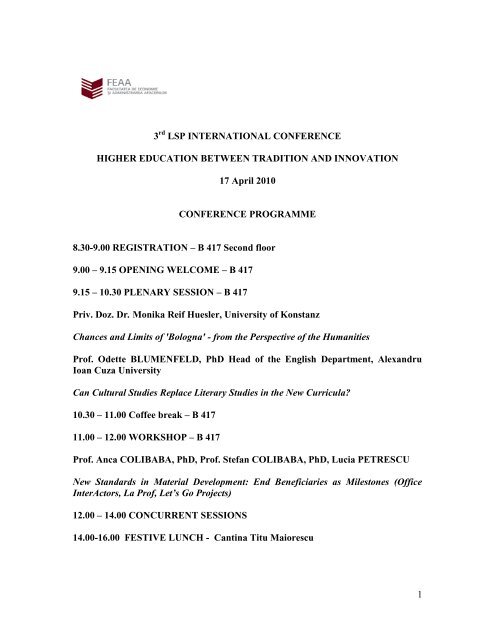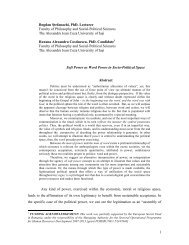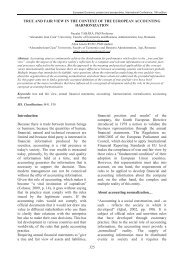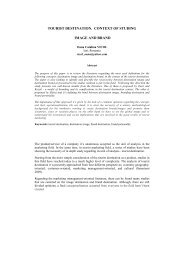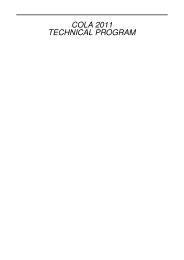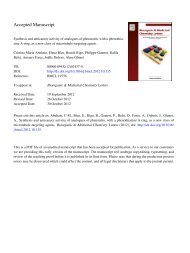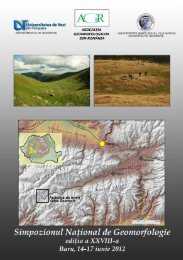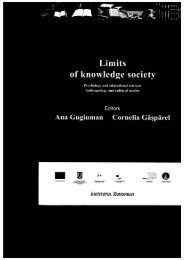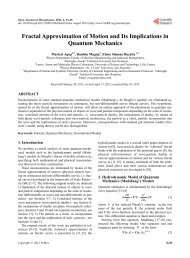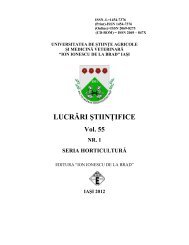1 3 LSP INTERNATIONAL CONFERENCE HIGHER EDUCATION ...
1 3 LSP INTERNATIONAL CONFERENCE HIGHER EDUCATION ...
1 3 LSP INTERNATIONAL CONFERENCE HIGHER EDUCATION ...
You also want an ePaper? Increase the reach of your titles
YUMPU automatically turns print PDFs into web optimized ePapers that Google loves.
3 rd <strong>LSP</strong> <strong>INTERNATIONAL</strong> <strong>CONFERENCE</strong><br />
<strong>HIGHER</strong> <strong>EDUCATION</strong> BETWEEN TRADITION AND INNOVATION<br />
17 April 2010<br />
<strong>CONFERENCE</strong> PROGRAMME<br />
8.30-9.00 REGISTRATION – B 417 Second floor<br />
9.00 – 9.15 OPENING WELCOME – B 417<br />
9.15 – 10.30 PLENARY SESSION – B 417<br />
Priv. Doz. Dr. Monika Reif Huesler, University of Konstanz<br />
Chances and Limits of 'Bologna' - from the Perspective of the Humanities<br />
Prof. Odette BLUMENFELD, PhD Head of the English Department, Alexandru<br />
Ioan Cuza University<br />
Can Cultural Studies Replace Literary Studies in the New Curricula?<br />
10.30 – 11.00 Coffee break – B 417<br />
11.00 – 12.00 WORKSHOP – B 417<br />
Prof. Anca COLIBABA, PhD, Prof. Stefan COLIBABA, PhD, Lucia PETRESCU<br />
New Standards in Material Development: End Beneficiaries as Milestones (Office<br />
InterActors, La Prof, Let’s Go Projects)<br />
12.00 – 14.00 CONCURRENT SESSIONS<br />
14.00-16.00 FESTIVE LUNCH - Cantina Titu Maiorescu<br />
1
CONCURRENT SESSIONS<br />
1. LANGUAGE STUDIES B 417<br />
Moderator: Anca Colibaba<br />
Marina Vraciu<br />
Alexandru Ioan Cuza University of Iaşi<br />
Your First Business Russian Class: An Overview of a Beginner's Course<br />
Various European curricula include Central and East European languages as part of their<br />
(post-)graduate regional studies, culture and history, or business programmes. As one of<br />
the languages in most demand offered by leading European universities, Russian stands<br />
apart as a result of the new demographic structure in Europe and the special EU-Russia<br />
programmes of cooperation. Russian as a subject in higher education in Romania has had<br />
to be repositioned as a result of some general and specific needs. With a tradition of over<br />
a century as an academic subject in the University of Iasi, Russian is now taught at all<br />
levels, from both „traditionally‟ philological perspectives and „innovatively‟, as a<br />
language of business communication. My talk will make a case for Russian as a subject<br />
in the post-graduate course of Slavic Culture and Applied Slavic Languages taught within<br />
the Department of Foreign Languages and Literatures in the Alexandru Ioan Cuza<br />
University of Iasi, by briefly presenting: 1. the levels of BR taught and tested; 2. the<br />
course outline (social, telephone, negotiating, presentations, letter writing)<br />
Athes Haralambie<br />
Alexandru Ioan Cuza University of Iaşi<br />
Awareness through Communicative Linguistic Games. Ecological Agenda in the<br />
Language Classroom<br />
Developing the adequate strategies to promote students‟ competence in the second<br />
language implies a constant appeal to the Communicative Approach. A methodology<br />
focused on communicative skills involves significant linguistic interaction, stimulates<br />
learners‟ independence and offers numerous possibilities to actively employ the second<br />
language in various contexts. The use of environmentalism as a source of authentic texts<br />
and topics for discussion in the language classroom simultaneously addresses linguistic<br />
progress – by developing conversational abilities, vocabulary and motivation – and<br />
ecological awareness – through the conceptualization and contextualization of major<br />
environmental issues.<br />
2
Anca Maria Slev and Anişoara Pop<br />
“Dimitrie Cantemir” University, Târgu-Mureş<br />
Identity and Second Language Acquisition<br />
Because there are conflicting pedagogical views among second language<br />
acquisition (SLA) theorists and practitioners on giving a theoretical and empirical<br />
account of the influence of the socio-cultural norms and values of an English-speaking<br />
country (input) on the one hand, and the social psychological phenomenon of second<br />
language acquisition (socially constructed interaction) on the other, this paper tries to<br />
illustrate the link and create a bridge between the two. The language learning process<br />
should be seen in a broader context than the individual, internal process. It is more social<br />
and interactive, and it involves acquiring or reestablishing a new linguistic identity.<br />
Monica Vlad, Anca Colibaba, Cintia Colibaba<br />
Euroed Foundation, Iaşi<br />
Quality Assurance for Language Learning Tools<br />
Faced with a lack of innovative language teaching materials in the past decades, language<br />
teaching staff and institutions must face nowadays yet another challenge: how to select<br />
the adequate, high-quality resources for their learners from a multitude of resources<br />
available. This article focuses on several instruments (such as linguistic audits or quality<br />
checklists) developed for quality assurance in the area of linguistic materials. Moreover,<br />
the methodology of employing these instruments shall be presented, with guidelines for<br />
university language departments, language centres, teachers and learners.<br />
Attila Imre<br />
Sapientia University, Târgu-Mureş<br />
Translating Subtitles with Translation Environment<br />
The paper deals with the new possibility of translating subtitles with translation<br />
environments. Previously translated texts are preserved in translation memories offering<br />
consistency when new subtitles are translated. Samples of subtitle translations (feature<br />
films, documentaries and cartoons) from English into Romanian are described using<br />
MemoQ translation environment, highlighting those aspects which may make the life of a<br />
subtitle translator easier.<br />
3
Florin Toma<br />
Alexandru Ioan Cuza University of Iaşi<br />
Evaluation in Academic Writing<br />
Most universities require students to pass an entry writing exam which consists most of<br />
the time in writing an essay. Why an essay? An essay provides full evidence of a writer‟s<br />
skills in terms of coherence, cohesion, grammar, spelling, punctuation, style, good usage<br />
of academic sources as well as originality. Knowing all the above-mentioned criteria and<br />
how to meet their requirements in an essay ensures the success in academic writing.<br />
Cristina Olariu<br />
Alexandru Ioan Cuza University of Iaşi<br />
Taking Refuge into Teaching with Glossaries<br />
Glossary Builders may represent a very useful tool in education. They can be used to<br />
develop custom glossaries for incorporation into online courses and other web<br />
resources. Reading material with a glossary is more accessible to students. Every teacher<br />
could make up his/her own glossary sheets to accompany a specific subject A glossary<br />
will take you a step further in creating dynamic learning environments for your students,<br />
being able to create amazing learning experiences for your students to help them excel<br />
and there is not only a specific way of doing things.<br />
Theoretically, a glossary manages and organizes all the terms and definitions,<br />
automatically alphabetizing them as they are added. Definitions can include text, images,<br />
bulleted or numbered lists, as well as links to additional web resources. Glossaries make<br />
it easy to set-up and maintain a good knowledge of all technical terms for any subject or<br />
on any website.<br />
2. TRADITION AND INNOVATION IN <strong>HIGHER</strong> <strong>EDUCATION</strong> B511<br />
Moderator: Luminiţa Andrei Cocârţă<br />
Ioana Creţu<br />
”Gr. T. Popa” University of Medicine and Pharmacy Iaşi<br />
Is Our Teaching of English for Specific Purposes Informed by the Recent Debate on<br />
Professionalism and Corresponding Trends in Education?<br />
In the capacity of both teacher of English to medical students and educational researcher,<br />
the author invites teachers of language and communication for specific purposes to revisit<br />
beliefs that drive and shape our everyday pedagogical decisions. Fueled by recent<br />
international literature on professionalism and implications for higher education, several<br />
4
questions are explored: what language and communication contributes to professional<br />
identity and behaviour? Are we addressing THAT in what and how we teach?<br />
Laura-Ioana Leon<br />
Universitatea de Medicină şi Farmacie "Gr.T.Popa”, Iaşi<br />
Global Thinking: Culture in Language Teaching<br />
Few developments in higher education have received as much broad-based attention as<br />
have recent attempts to expand the traditional curriculum by incorporating elements of<br />
culture in language teaching. Foreign language learning is comprised of several<br />
components, including grammatical components, communicative competence, language<br />
proficiency, as well as a change in attitudes towards one‟s own or another culture.<br />
Cultural competence, i.e. the knowledge of conventions, customs, beliefs, and systems of<br />
meaning of another country, is undoubtedly an integral part of foreign language learning,<br />
and many teachers have seen it as their goal to incorporate the teaching of culture into<br />
foreign language curriculum. On the other hand these elements of culture will help<br />
students see how knowledge has been historically produced, hierarchically ordered. All<br />
the cultural practices that circulate in society open the possibility for understanding a<br />
wide variety of new cultural forms. The new informational technologies, multimedia, and<br />
visual culture help educators to become more reflective, see how they perceive new<br />
technologies, popular texts, and diverse forms of visual culture, including how they<br />
structure social relations, values, varied definitions of the self and others.<br />
Anisoara Pop and Anca Maria Slev<br />
“Dimitrie Cantemir” University,Târgu-Mureş<br />
Platforms for Effective Asynchronous Communication in <strong>LSP</strong>: Yahoo Groups and<br />
Wikipedias<br />
Although higher education students are increasingly pressured to take part in group<br />
collaborative projects that can hardly be accomplished in real time due to logistical<br />
difficulties, rarely are they provided with the appropriate tools to carry them out. Based<br />
on examination of cooperative projects and personal reflection, we propose to raise the<br />
awareness about the valences of two platforms for asynchronous collaborative<br />
communication in higher education EFL/<strong>LSP</strong> , i.e. Yahoo groups and Wikipedias, able<br />
to motivate, support, and encourage high levels of collaboration and cooperation among<br />
groups of learners, making them state of the art tools for effective language learning and<br />
professional development.<br />
5
Luminita Andrei Cocârţă and Olesia Lupu<br />
Universitatea “Al. I. Cuza” din Iaşi<br />
Distance Learning and Innovation in Higher Education<br />
The paper presents aspects of distance learning as on-going learning at the Faculty of<br />
Economics and Business Administration, suggesting activities that would maximize the<br />
benefits and minimize the limitations of students and trainers that participate in this form<br />
of learning.<br />
Anca Cecal<br />
Alexandru Ioan Cuza University of Iaşi<br />
Tradition and Innovation in Handling Presentation Challenges<br />
This paper will explore the sometimes inevitable difficulties and challenges that speakers<br />
might encounter in delivering presentations, and especially try to find possible and<br />
feasible solutions. Our focus will be mainly on old and new ways to overcome<br />
presentation stress or podium fright, as well as on diverse types of questions and how to<br />
deal with them successfully.<br />
Christopher Lawson<br />
Alexandru Ioan Cuza University of Iaşi<br />
Using PowerPoint in business presentations: visual aid for the audience or crutch<br />
for the speaker?<br />
Making presentations, one of the key skills of Business English, has greatly improved in<br />
Romania, despite a chequered history. I would like to look at Romanian business<br />
presentations, with especial reference to the advantages and disadvantages of the use of<br />
Powerpoint.<br />
Oana Surugiu<br />
Alexandru Ioan Cuza University of Iaşi<br />
From Music on the Stage to Music on the Page: Song Translation in Language<br />
Teaching<br />
The intersection of translation and music can prove to be a fascinating area to explore,<br />
increasingly gaining the interest of specialized translators and scholars and also of<br />
researchers in translation studies, cultural studies, media studies and musicology.<br />
My paper aims to discuss the special issue of multimedial translation, as well as the way<br />
in which song translation can be used as an effective way of language teaching, with a<br />
6
focus on Leonard Cohen‟s musical lyrics. I have chosen Leonard Cohen‟s songs as cases<br />
in point, since they beautifully capture important issues of human life, create strong<br />
images, combine improbable elements and therefore, seem to express best the<br />
relationship between text and music, as well as the power of language and the musicality<br />
of expression.<br />
3. CULTURAL STUDIES B 516<br />
Moderator: Dana Bădulescu<br />
Dana Bădulescu and Oana Maria Petrovici<br />
Alexandru Ioan Cuza University of Iaşi<br />
Aspects of International versus Local Teaching with Philological University<br />
Students<br />
The paper attempts to compare the learning experience of the students in the Faculty of<br />
Letters at “Alexandru Ioan Cuza” University of Iasi to that of the students who study<br />
abroad on Erasmus student mobilities. The premise is that we can identify a set of<br />
common features that characterize a course as “International”, either through its content<br />
and impact, or through certain methodological elements irrespective of country or<br />
location. The finding is empirical and results from the surveys we have conducted with<br />
both Erasmus, and non-Erasmus philological students. If there is such a pattern, this<br />
paper explores its applicability and limits at both the local university level, and at<br />
international level.<br />
Florin Salajan and Sorina Chiper<br />
Columbia University, Alexandru Ioan Cuza University of Iaşi<br />
Romanian Higher Education: Grassroots Assessment of the Status of<br />
Europeanisation<br />
Europeanisation has recently come into focus as the critical site of investigation of the<br />
changes and transformations that national institutions, groups and individuals have<br />
undergone, in a “strong” and “weak” process of integration into the European Union. Our<br />
presentation deals with Romanian students‟ and university leaders‟ perceptions of the<br />
Europeanisation of Romanian higher education via mobility schemes. Our research<br />
findings are based on two online surveys conducted in 2008-2009, which assesses the<br />
challenges and (failed) opportunities entailed in student mobilities.<br />
7
Ovidiu Gavrilovici<br />
Alexandru Ioan Cuza University of Iaşi<br />
Narrative Approach in Social Sciences and Management: Survival or Reengineering<br />
of the Species?<br />
Globalization challenges linear and systemic thinking, altogether. The challenges of the<br />
‟70s - a climax of applied systemic thinking in social sciences and economics – are<br />
surpassed by the changes of the „80s and „90s, with new additions in complexity<br />
dimensions, and of an (im)probable: new crisis of selecting and expressing meanings,<br />
which cannot be captured nowadays via laws with generality pretention. What are the<br />
guiding threads, between tradition and innovation, for intervention oriented thinking in<br />
social and management fields? The rediscovery of the discourse transports (catharsis) the<br />
person whose story becomes, in the centre, the main character towards a new chance of<br />
identity development. The change becomes profoundly localized with the inner root in<br />
the processes of meaning making we are capable to engage, creatively and resourcefully.<br />
Mona Cojocaru<br />
Alexandru Ioan Cuza University of Iaşi<br />
Myth and Consumerism in the Work of Arthur Miller<br />
There is a deep connection between the consumerist age, which had already begun to set<br />
its standards, the capitalist dictatorship which had spread throughout America and Arthur<br />
Miller‟s creation of The Misfits. It could be envisaged as an attempt to embody a<br />
historical moment and a milieu. As Wallace Stevens suggests, the end of an era is always<br />
a prolific source of imagination and this particular story imagines the termination of a<br />
hallowed American myth, the dying out of the old frontier and its values. What Arthur<br />
Miller intends in The Misfits, first of all, is to catch a historical moment in America‟s<br />
attempt to break with its past values in order to move on, to make way for what was<br />
generally acknowledged as progress.<br />
Paula-Andreea Vlad<br />
Alexandru Ioan Cuza University of Iaşi<br />
Cultural Identity and New Methods of Interpretation in Henry James’s Works<br />
The novels of Henry James have often been considered difficult readings. In my<br />
attempt to decipher “the Jamesian secret”, there were a few recurrent elements which<br />
challenged me to see his work from another perspective: the characters‟ quest for cultural<br />
identity, seen through visual arts. The present paper is an attempt to explain James‟ use of<br />
visual arts in his novels. I discovered that the arts offered a “system of<br />
observation”(Bowden, 1969: ix), a method of interpretative approach to the novels, that<br />
8
was critically valid and in particular offered a wonderful means of grasping the central<br />
themes.<br />
Ana-Magdalena Petraru<br />
Alexandru Ioan Cuza University of Iaşi<br />
Traditional and Innovatory Aspects of Canadian Literature in Romanian<br />
Periodicals<br />
This paper aims at giving a clear picture of the translations and critical studies published<br />
in Romanian periodicals from the inter-war years to the post-communist period.<br />
Moreover, it will try to give reasons for the criteria of selection that operated in the<br />
choice of published authors and establish the favourite literary figures for each period. It<br />
will also try to account for the predilection of certain genres in different periods of<br />
reception and carry out contrastive and quantitative research to explain the differences in<br />
the Romanian reception between the inter-war, communist and post-communist years.<br />
4. ROMANCE LANGUAGE STUDIES B518<br />
Moderator: Carmen Stefania Stoean<br />
Carmen Stefania Stoean<br />
ASE, Bucharest<br />
Sur la possibilité d’élaborer un guide de bonnes pratiques méthodologiques<br />
Notre propos n‟est pas une suite d‟arguments à l‟appui d‟un ensemble d‟idées dont le<br />
bien fondé doit être prouvé mais plutôt une série de questionnements sur la possibilité<br />
d‟élaborer un corps de principes généraux à propos des méthodologies à utiliser dans<br />
l‟enseignement du FLE au niveau de l‟enseignement supérieur. Plus concrètement, nous<br />
nous intéressons aux critères requis pour construire un ensemble de méthodologies<br />
susceptibles d‟être utilisées pour haque forme de FLE, quls que soient les contextes<br />
didactiques. Si cette construction s‟avère possible, on pourrait aboutir à une<br />
harmonisation des processus d‟enseignement du FLE par niveau de scolarisation sans<br />
distinction de contextes social, politique , culturel ou institutionnel.<br />
9
Andreea Cleminte, Oana Gorea EuroEd Foundation<br />
Claudia Dinu, ”Gr. T. Popa” University of Medicine and Pharmacy Iaşi<br />
Inovaţia în cadrul educaţiei pentru a facilita îmbunătăţirea comunicării şi a<br />
interacţiunii interculturale – Studii de caz Language and Integration through Singing şi<br />
Art commnon language<br />
Prezenta lucrare se adresează cadrelor didactice şi doreşte să prezinte două metodologii în<br />
lucrul cu studenţii, pentru a încuraja inovaţia în cadrul educaţiei şi pentru a facilita<br />
integrarea în vederea dezvoltării şi îmbunătaţirii comunicării şi a interacţiunii<br />
interculturale. Ideea de ordin metodologic şi didactic de la care s-a plecat în elaborarea<br />
proiectului „Language and Integration through Singing” o constituie importanţa pe care<br />
muzica şi cântecele o au în învăţarea limbii române, ca şi limbă străină, pentru studenţii<br />
imigranţi şi Erasmus. Scopul proiectului „Art commnon language” este acela de a atrage<br />
adulţii către înţelegerea asemănărilor şi diferenţelor culturale, ceea ce va contribui la<br />
îmbunătăţirea dialogului intercultural.<br />
Irina Dabija, Anca Doina Ciobotaru<br />
Universitatea de Arte ,,George Enescu’’ Iaşi<br />
Tehnici alternative in predarea limbilor straine<br />
În sistemul universitar predarea unei limbi străine s-a transformat dintr-un<br />
deziderat al studenţilor într-o necesitate ce are la bază atât dorinţa de perfecţionare a<br />
acestora, cât şi cea a universităţilor de a le oferi cunoştinţe ample, diversificate şi utile.<br />
Metoda tradiţională este cea mai des folosită, atât datorită rezultatelor obţinute de-a<br />
lungul anilor cât şi datorită posibilităţii de evaluare a cunoştinţelor dobândite. Totuşi,<br />
seminariile de limbă străină pot fi condimentate şi cu exerciţii ce folosesc tehnici<br />
alternative, bazate în special pe ludic. Acestea nu doar relaxează atmosfera, dar reuşesc să<br />
transmită informaţiile sub o formă mai atractivă, aparent mai lejeră, de joc, dar cu<br />
aceleaşi rezultate.<br />
Ana Sanduloviciu<br />
Alexandru Ioan Cuza University of Iaşi<br />
Enrichissement et innovation du langage économique et des affaires français et<br />
roumain par le « Mot d’or »<br />
Concours dont l‟idée de base soutient la créativité, l‟imagination et l‟ingéniosité sur le<br />
terrain du français des affaires, le « Mot d‟Or » offre aux enseignants de FOS (français<br />
pour objectifs spécifiques) la possibilité d‟offrir aux apprenants une vraie aventure<br />
terminologique : ceux-ci doivent devenir créatifs et ont même la liberté de créer des mots<br />
nouveaux pour des concepts nouveaux, en français et en roumain aussi.<br />
Nous voulons démontrer, par notre communication, comment peut-on innover nos<br />
méthodes d‟enseignement du français des affaires grâce aux types d‟exercices du<br />
10
concours. Premièrement, les matériaux de travail proposés par le « Mot d‟or » se trouvent<br />
sur Internet. Les étudiants découvrent ainsi toute une variété de ressources, des détails<br />
concernant l‟histoire du concours et celle de la terminologie économique en France.<br />
Ensuite, ils doivent imaginer un projet d‟affaires implanté dans la réalité économique<br />
roumaine, exercice de simulation qui représente un vrai défi pour leur imagination.<br />
Mihaela Lupu, Dana Nica<br />
Alexandru Ioan Cuza University of Iaşi<br />
Les langues romanes à l’heure de l’intercompréhension : le projet transversal<br />
GALAPRO<br />
Les auteurs se proposent de présenter le projet international GALAPRO Formation de<br />
formateurs à l’intercompréhension en langues romanes, financé par la Commission<br />
Européenne. Réunissant neuf universités européennes – Aveiro, Madrid, Barcelone,<br />
Cassino, Pise, Grenoble 3, Lyon 2, Mons-Hainaut, Iași – qui représentent six langues<br />
romanes (portugais, espagnol, catalan, italien, français, roumain), ce projet répond à la<br />
politique européenne axée sur le plurilinguisme. Il allie les outils traditionnels de<br />
l‟enseignement des langues (grammaires, dossiers de presse, ressources écrites et orales)<br />
aux outils modernes (plateformes en ligne, TICE, forums, chats). Dans le vaste paysage<br />
des initiatives et activités visant l‟apprentissage des langues modernes, ce projet<br />
transeuropéen a pour but tant de former des formateurs à l‟intercompréhension en langues<br />
romanes, que d‟offrir à tous publics une méthode souple et vivante pour comprendre et<br />
s‟approprier des langues voisines.<br />
5. REVISITING ART, CULTURE AND LITERATURE B 503<br />
Moderator: Dragoş Cojocaru<br />
Cristian Ungureanu<br />
Alexandru Ioan Cuza University of Iaşi<br />
De la drama schilleriană la opera lirică-Luisa Miller, o nouă abordare<br />
Libretul operei Luisa Miller de Giuseppe Verdi a fost compus de Salvatore Cammarano,<br />
în 1849, pornind de la drama Kabale und Liebe de F. Schiller. Atât din motive ce ţin de<br />
specificul operei ca gen muzical, cât şi din cauza contextului istoric, autorul libretului a<br />
fost nevoit să aducă anumite modificări textului original, la nivelul subiectului, al<br />
personajelor sau al conflictului. Analiza de faţă îşi propune să urmărească modificările<br />
operate la nivelul personajelor (inventarea unor personaje, eliminarea altora, modificarea<br />
statutului social, sublinierea unor trăsături de caracter, etc.) şi posibilele interpretări ale<br />
acestora.<br />
11
Bogdan Creţu<br />
Alexandru Ioan Cuza University of Iaşi<br />
O răstălmăcire barocă a bestiarului tradiţional: nevăstuica adulterină a lui Dimitrie<br />
Cantemir<br />
Dimitrie Cantemir is the first Romanian writer who dares not obey the medieval<br />
convention on the symbol; he uses a large area of symbols, but not in their spirit; he<br />
modifies them according to his aims. For example, he makes the weasel an adulterine<br />
wife, as long as the medievals referred to it, following the Physiologus, as to a symbol of<br />
Virgin Mary or even of Jesus Christ.<br />
Leonte Ivanov<br />
Alexandru Ioan Cuza University of Iaşi<br />
Motivul banilor în creaţia lui Dostoievski<br />
Semnatarul acestei lucrări îşi propune să abordeze, pe baza operei artistice şi a<br />
corespondenţei dostoievskiene, semnificaţia aparte pe care motivul banilor l-a avut în<br />
viaţa marelui romancier şi în cea a personajelor sale, ştiut fiind faptul că Dostoievski<br />
considera suma de 3 000 de ruble baremul ce desparte sărăcia de bunăstare. Un barem pe<br />
care scriitorul însuşi l-a putut atinge abia în ultima perioadă a vieţii.<br />
Dragos Cojocaru<br />
Alexandru Ioan Cuza University of Iaşi<br />
Melodrama romantică – obiect de studiu la Masterul de limbă, literatură şi<br />
civilizaţie italiană<br />
Melodrama italiană reprezintă o sinteză a culturilor naţionale europene, cu ample<br />
deschideri către civilizaţiile de pe celelalte continente, şi totodată o sinteză a artelor<br />
(literatură, muzică, arhitectură, teatru ş.a.m.d.) ce permite o abordare interdisciplinară şi<br />
multiculturală. Lucrarea de faţa îşi propune prezentarea modului de integrare a acestei<br />
tematici în programa cursurilor de master de limbă, literatură şi civilizaţie italiană.<br />
Laura Munteanu<br />
Alexandru Ioan Cuza University of Iaşi<br />
Mateiu I. Caragiale între tradiţie şi decadenţă<br />
Lumea romanului Craii de Curtea-Veche, al lui Mateiu I. Caragiale, se revendică de la<br />
permanente oscilări între senin şi demonic, între nobil şi josnic, aristocrat şi degenerat,<br />
solar şi nocturn. În sensul acesta, însăşi viziunea care stă la baza organizării lumii textului<br />
12
este una a jocului punct – contrapunct, deci grotescă. Personajele sunt construite pe baza<br />
unor tensiuni interioare care le arată drept fiinţe scindate, împărţindu-se între un regim de<br />
lâncezeală diurnă şi unul de hoinăreală nocturn-demonică, între o nobleţe a spiritului,<br />
cultivată prin artă şi preocupări ştiinţifice, respectiv o degradare în viciu şi sordid.<br />
„Hagialâcurile” nu sunt altceva decât peregrinările unor oameni care sunt în explorare de<br />
sine. Tehnica acesta a contrapunctului este fundamentală în construirea personajelor, mai<br />
ales a lui Paşadia, respectiv a lui Pantazi. În permanenţă naratorul accentuează asupra<br />
ideii de aristocraţie a celor două spirite, atât ca stirpe, urmărită în descendenţa ei, cât şi ca<br />
spirit şi comportament. Spovedaniile celor doi prieteni ai naratorului arată însă că în<br />
descendenţa amândurora stirpea aristocrată se altoieşte pe un sol plebeu, astfel încât<br />
tradiţia boierească se împleteşte cu degenerescenţa şi decadenţa.<br />
Florin Munteanu<br />
Alexandru Ioan Cuza University of Iaşi<br />
Literatura anticomunistă ca instrument complementar istoriei<br />
Învăţământul superior românesc postrevoluţionar a început, în ultimii ani, o ofensivă<br />
serioasă în ceea ce priveşte construirea unei reprezentări cât mai credibile a ceea ce a<br />
însemnat societatea românească în perioada comunistă. Pe lângă studiile istorice<br />
specifice, inclusiv arheologice, studiul memorialisticii de detenţie constituie un izvor<br />
extrem de valoros pentru cercetători. De la Denis Delletant la Marius Oprea sau Vladimir<br />
Tismăneanu, ca să numim doar câţiva dintre cei mai cunoscuţi cercetători ai fenomenului<br />
comunismului românesc, cei care s-au preocupat de sondarea şi construirea unui discurs,<br />
fie şi doar universitar, despre epocă, au recurs la mijloace diferite, de la cercetarea<br />
arheologică ( în cazul lui Marius Oprea) la studiul comparativ de factură politologică, în<br />
care factorul istoric este privit în conjuncţie cu caracterul etnotipic al românilor şi cu<br />
dinamica politică a relaţiei cu U.R.S.S. (Vladimir Tismăneanu), elemente ce tensionau<br />
câmpul relaţiilor politice din România. Printre aceste abordări, tradiţionale, studiul<br />
literaturii de detenţie apare ca un unghi inovator, măcar dacă avem în vedere importanţa<br />
majoră pe care editurile au acordat-o tipăririi acestor texte în ultimii ani şi caracterul<br />
exogen al literaturii, în general, în raport cu istoria.<br />
Despre literatura de detenţie din spaţiul concentraţionar românesc s-au scris multe<br />
cărţi, jurnale, studii, recenzii, după Revoluţia din decembrie ‟89, majoritatea dintre ele<br />
concentrându-şi atenţia pe recuperarea istoriei, a tragediei personale, cu valoare<br />
exponenţial naţională, prin care au trecut deţinuţii politici. Puţine au fost, însă, încercările<br />
în care literatura de detenţie a fost privită în ceea ce numele ei generic, de „literatură”,<br />
presupune, adică sub raportul „literarităţii” textelor respective, a strategiilor<br />
comunicaţionale de tip literar pe care textele respective le înfăţisează şi de care autorii<br />
paginilor despre detenţie au fost mai mult sau mai puţin conştienţi.<br />
13
6. GERMAN STUDIES B507<br />
Moderator: Magdalena Leca<br />
Lora Constantinescu<br />
Academy of Economics in Bucharest<br />
Ein Lehrwerk mit seinen Herausforderungen im DU zwischen Studienbegleitendem<br />
DU und Fachsprachenunterricht<br />
(A Teaching Material and its Challenges in Teaching German as ‘’SDU’’ and <strong>LSP</strong>)<br />
What kind of teaching materials are required for FL-/<strong>LSP</strong>-teaching of German for<br />
Economics? With German attempting a international repositioning, but with a view to<br />
present day requirements, the (beginner level) course-book “Mit Deutsch in<br />
Europa”/2009 is meant to:<br />
a) meet the students‟ communication needs and interest for international mobility,<br />
study and the learning of German;<br />
b) to offer a possible image of what SDU/”Studienbegleitender<br />
Deutschunterricht” can be;<br />
c) help the learners build an “European profile“ of competences and skills for<br />
their career, as well as to better understand the European diversity, thus<br />
enhancing language and cultural awareness<br />
Casia Zaharia<br />
Alexandru Ioan Cuza University of Iaşi<br />
The German Influence upon the Romanian Terminology in Mathematics between<br />
Tradition and Innovation<br />
At the level of educated people, the Romanian society learned about the latest<br />
developments in the science of Western and Central Europe from those educated in<br />
Germany, who borrowed terms from German, in order to render the non scientific notions<br />
in Romanian. The present paper aims at studying the influence of the German language<br />
upon the terminology in mathematics. The corpus derives from a dictionary (mainly for<br />
neologisms) and four specialized papers written in different periods of developments of<br />
the modern Romanian language.<br />
Magdalena Leca<br />
Alexandru Ioan Cuza University of Iaşi<br />
to be announced<br />
14
Rusu Viorel-Liviu<br />
Alexandru Ioan Cuza University of Iaşi<br />
Foreign Teachers in Germany<br />
The present paper highlights the main problems that foreign teachers have to deal with<br />
when they decide to teach in Germany. Not only the fact that they come from another<br />
country with different customs and traditions, but also their education, their<br />
qualifications, their social status and the long process of recruitment can influence the life<br />
of these teachers, the way they do their job and their relationship with the German<br />
colleagues.<br />
7. CHALLENGES IN ECONOMIC <strong>HIGHER</strong> <strong>EDUCATION</strong> B513<br />
MODERATOR: Marius Apostoaie<br />
Alina Camelia Sargu<br />
Alexandru Ioan Cuza University of Iaşi<br />
Increasing the Quality of e-Learning in Financial Higher Education<br />
In recent years e-learning has become a reliable way for delivering financial higher<br />
education both for distant learning and as support for traditional teaching. The methods<br />
and platforms used in this process have evolved also, allowing for a more direct,<br />
interactive and enhanced experience. The aim of this paper is to underline the importance<br />
of student feed-back as way of assuring that financial higher education carried out<br />
through e-learning methods provides a high quality, high impact teaching experience.<br />
Through an extended literature review and empirical evidence we provide the necessary<br />
arguments in favor of student feed-back as a way of achieving these goals.<br />
Irina Bosie<br />
Alexandru Ioan Cuza University of Iaşi<br />
The Allocation of Financial Resources, a Contributing Factor to the Improvement of<br />
Education<br />
The society became aware that the need for raising educational standards is one of the<br />
primary issues for the society development, such standards being accomplished through a<br />
proper allocation and management of financial resources required for activities at each<br />
level. Education contributes to a great extent to the progress of society and the State is to<br />
decide which the closest measures for financing the education system are.<br />
15
Bogdan Ilut<br />
Alexandru Ioan Cuza University of Iaşi<br />
The Impact of Web 2.0 Tools on Higher Education Deliverability<br />
The internet has an organic connection to higher education and the way courses are<br />
delivered. As the web 2.0 tools become more and more familiar they allow users an<br />
enhancement in interactivity and usage of on-line materials. The aim of this paper is to<br />
provide a look on how these tools enhance the deliverability of higher education<br />
products. For this we provide in a non-exhaustive manner a look on the main works and<br />
theories in this field, while also underlining their impact using empirical data.<br />
Marius Apostoaie<br />
Alexandru Ioan Cuza University of Iaşi<br />
Central Banks and Their Involvement in Fostering Economic Education and Literacy<br />
In our knowledge based society, economic education plays a vital role in the future health<br />
of the world economy and, it enables citizens to efficiently participate in the society in<br />
which they live. The economic literacy of citizens is, in our present days, not only the<br />
problem of state authorities, but also a common challenge and responsibility for many<br />
public institutions and non-profit organizations.<br />
Key players among these institutions are central banks that invest significant<br />
resources in educating the public to achieve economic efficiency, a good conduct of<br />
economic (and monetary) policy and welfare. This study intends to highlight the<br />
involvement of more and more central banks in fostering economic education and<br />
literacy.<br />
Izabella Krájnik<br />
„Babeş-Bolyai” University, Cluj Napoca<br />
A Modern Issue: Developments in Pension Reform in the European Union<br />
This paper is about public sector pensions, an issue that has become increasingly<br />
contentious in a number of countries in recent years, including in the European Union.<br />
One of the key differences is that the residual risk in a pension fund is collectively borne<br />
by the beneficiaries and the sponsor while it is borne by the external shareholders in the<br />
case of a life insurer. This paper employs a contingent claim approach to evaluate the risk<br />
return for annuitants.<br />
16
Adrian Brunello<br />
Alexandru Ioan Cuza University of Iaşi<br />
Innovation and Innovative Teaching in Marketing<br />
Innovation is a significant aspect in the study of economics, business, entrepreneurship,<br />
design, technology, sociology, and engineering. In Marketing innovation is compulsory.<br />
Marketers tend to focus on the process itself, from the origin of the concept to its<br />
metamorphosis into something useful. Marketing teachers must also be innovative in the<br />
way they present their lectures and seminars to students in order to attract them and raise<br />
their interest in this often tricky field of Economics. The paper focuses on ways of being<br />
innovative in marketing and in its teaching; it also stresses upon the fact that innovation<br />
in case study methodology illustrates the vitality of the level of business in an academic<br />
setting.<br />
Gabriela Geangalau, Bogdan Irimia<br />
Alexandru Ioan Cuza University of Iaşi<br />
E-Learning in Romania: Opportunities, challenges and solutions<br />
In recent years the higher education system in Romania has been through a series<br />
of transformations. These transformations reflect not only the European tendencies, but<br />
also the growth of the Romanian economy. The changes also affect Distance Education.<br />
As Romania promotes innovation in education, e-Learning is seen as a further step in<br />
high-education delivery and improving business efficiency. The main ideas that our paper<br />
focuses on are: the extent to which E-Learning is implemented and understood in<br />
Romania; the main benefits of E-Learning; the main challenges of E-Learning in<br />
Romania, and the steps that need to be taken in order to make E-Learning a viable<br />
solution of learning in the near future.<br />
Gina Albu<br />
Alexandru Ioan Cuza University of Iaşi<br />
Curba lui Gauss : mit sau realitate<br />
Mit sau realitate, curba lui Gauss chiar există sau sunt numai vorbe?<br />
Ar trebui să ne întrebam de fapt ce dorim de la aceste examene. Mai are rost organizarea<br />
lor sau o simplă tragere la sorţi ar simplifica cu mult lucrurile. Este sau nu necesara curba<br />
lui Gauss într-un sistem în care inevitabil trebuie să creăm ierarhii? Însă fără ierarhii o<br />
societate nu poate avea valori şi echitate şi începem să ne întrebam ce rol mai are<br />
profesorul. Oare doar acela de a crea şi stabili ierarhii?<br />
17
Moha Arouch<br />
Université Hassan 1 er , Maroc<br />
La simulation comportementale au service de l‘éducation à l’entrepreneuriat<br />
Un programme de formation à l‟entrepreneuriat doit mettre en mouvement un processus<br />
d'apprentissage par lequel des aptitudes, des connaissances, des habitudes et des attitudes<br />
sont acquises et changées. Il doit agir sur le comportement de l‟apprenant de manière à<br />
modifier ces capacités et aptitudes entrepreneuriales et lui permettre d‟être plus<br />
entreprenant en toute circonstance. Un tel enseignement implique un apprentissage<br />
participatif où l‟apprenant est responsable et proactif de la démarche d‟apprentissage.<br />
Dans cet article, nous présentons l‟expérience du programme de formation pour le<br />
« Développement des Compétences Entrepreneuriales (DCE) » développé et mis en<br />
œuvre au sein de l‟Université Hassan 1 er , Maroc, depuis l‟année universitaire 2005/2006.<br />
La formation/action vise à sensibiliser les étudiants, les aider à découvrir, vivre et<br />
développer leurs compétences entrepreneuriales.<br />
Anamaria Maftei<br />
Alexandru Ioan Cuza University of Iaşi<br />
Reconsiderarea efectelor cunoaşterii tacite asupra externalităţilor de cunoştinţe<br />
Majoritatea studiilor de specialitate ce analizează externalităţile de cunoştinţe pornesc de<br />
la ipoteza că aceastea conduc la efecte de aglomerare şi constituie un fenomen puternic<br />
delimitat în spaţiu. Importanţa proximităţii geografice în propagarea externalităţilor de<br />
cunoştinţe este atribuită, în principal, naturii tacite a cunoştinţelor. Articolul de faţă îşi<br />
propune să analizeze, dintr-o perspectivă critică, impactul dimensiunii tacite a cunoaşterii<br />
asupra transferului de cunoştinţe. Atunci când tăcerea nu mai este considerată o<br />
proprietate intrinsecă a cunoaşterii, ci a mesajelor schimbate în comunitatea epistemică,<br />
proximitatea fizică poate juca un rol mult mai complex decât o simplă condiţie a<br />
asimilării externalităţilor de cunoştinţe.<br />
18


